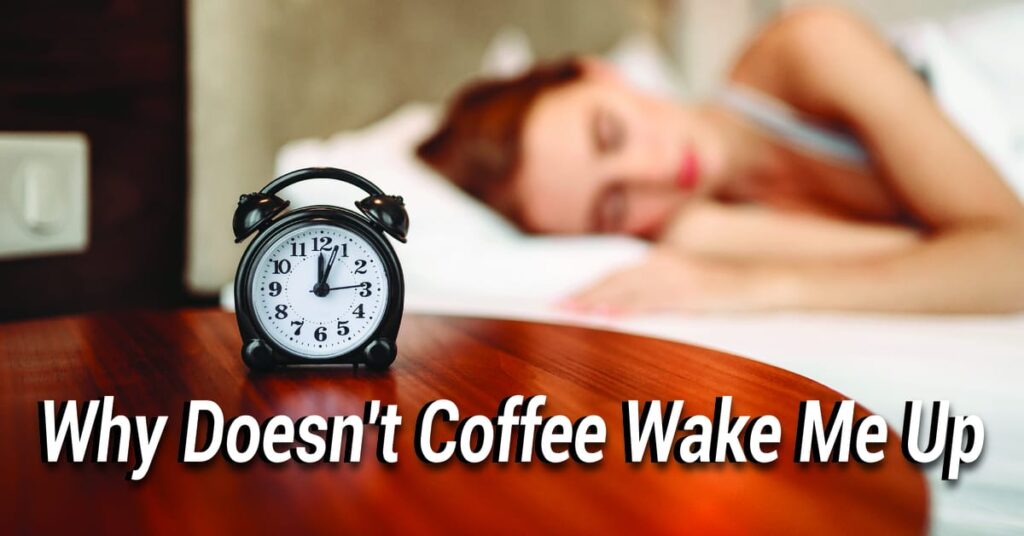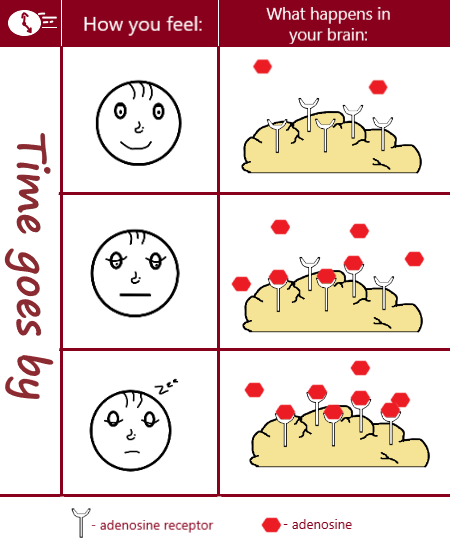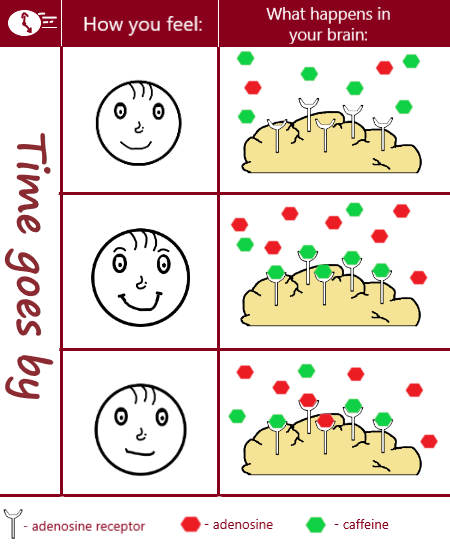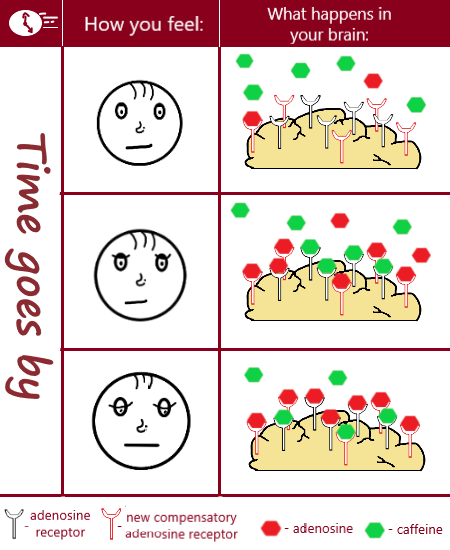We all know the feeling. You drink a cup of coffee, but instead of feeling more awake, you feel more tired. Why Doesn’t Coffee Wake Me Up? This is a question that many people ask themselves, and the answer is not always clear. In this blog post, we will explore the causes of caffeine fatigue and offer some solutions to help you feel more awake!
Caffeine is a stimulant that works by blocking certain chemicals in the brain that promote sleep. When you drink caffeine, it prevents these sleep-promoting chemicals from doing their job, which should make you feel more awake. So Why Doesn’t Coffee Wake Me Up?
There are some tips and tricks that you might find useful, so let’s get started.
Table of Contents
How Does Caffeine Work?
Before we get into why coffee doesn’t wake you up, let’s discuss how caffeine works in the body:
Caffeine works by disguising itself as an adenosine receptor, which is what causes sleepiness and drowsiness. When the molecule of this compound binds to their receptors in the brain, activity slows down and body becomes relaxed. Preventing adenosine from binding with its receptor prevents fatigue or tiredness and instead increases alertness. Caffeinated drinks can also increase a person’s adrenaline levels or one’s flight-or-fight response–which might also result in increased anxiety to some degree.
Why Doesn’t Coffee Wake Me Up? (6 Reason)

Is a question I get asked a lot. And it’s a valid question. If coffee is supposed to be a wake-up drink, Why Doesn’t Coffee Wake Me Up?
There are several possible causes for this, which we will discuss. So, here are the 6 reasons why coffee doesn’t help you wake up:
- You’ve developed a tolerance to caffeine.
- You are a quick caffeine metabolizer.
- You added too much sugar in your espresso.
- You are dehydrated.
- You’re already too tired for it to work.
- You’ve changed the type of coffee you’re drinking (coffee beans or brewing method).
1. You’ve developed a tolerance to caffeine.
It’s probably best to start with an explanation of what is in coffee that wakes you up and how it works:
Coffee contains caffeine, which is the key component that helps you wake up. It operates by blocking the adenosine receptor.
Adenosine is a sleep-inducing inhibitory neurotransmitter that lowers alertness.
Adenosine levels climb each hour while we are awake and fall throughout the sleep recovery phase.
The following diagram depicts how adenosine works:

Caffeine attaches to adenosine receptors when we consume coffee because its molecule is structurally similar to adenosine. It has opposing effects by inhibiting adenosine neurotransmitters, such as the enhanced wakefulness associated with coffee drinking.
Caffeine raises dopamine levels as a result of the adenosine blockade, which helps with attention, sociability, energy, and enjoyment.

If you drink caffeinated beverages on a daily basis, such as coffee, tea, or energy drinks, your body will eventually start producing extra adenosine receptors to compensate for the ones that are continually clogged by the caffeine.
This signifies you’ve developed a caffeine tolerance and need to consume more coffee to get the same amount of energy boost. This is one of the most typical reasons why you no longer feel the effects of coffee.

If you decide to increase your daily coffee intake, keep in mind that the FDA recommends no more than 400 mg of caffeine each day.This is approximately 4 or 5 regular cups.
If you’re already drinking that much, doubling your daily amount could lead to insomnia, anxiety, nausea, a racing heart, and other unpleasant side effects that we all should try to avoid. I have suffered a lot due to this so that’s why I take such vacations every 6 months or so, and after each one, I try to drink my cup just when I truly need the superpowers of coffee. Caffeine tolerance is built up more slowly this way.
Despite this, I always return to my daily coffee consumption, but I now know what to do when caffeine no longer has the same effect.
You must be arranged that there may be some caffeine withdrawal side effects like cerebral pain, fatigue and its hard to concentrate on the principal for several days. I generally start this detox when I have 2 ensuing days off as it’s a piece difficult for me to deal with the uneasiness at work.
I feel drowsy and furthermore have a cerebral pain for the initial 2 days. In some cases, I take ibuprofen to improve things. On the off chance that you don’t want to take any medication – have your morning espresso substituted with an apple.
That is the reason I do those breaks at regular intervals or so and after everyone, I attempt to possibly have my cup when I truly feel like I want those espresso superpowers. This way the caffeine resistance develops all the more slowly.
2. You are a quick caffeine metabolizer
At the end of the day, espresso doesn’t awaken you since you’re one individuals that aren’t delicate to its dynamic ingredient. Caffeine is processed by a compound whose capacity might fluctuate among various individuals as per an individual’s qualities. A few people are quick caffeine metabolizers, while others convey the variation that utilizes caffeine all the more slowly.
So assuming you’re hereditarily inclined toward process the caffeine particle quick, you will be unable to feel its impacts to a full degree. This likewise implies that your caffeine responsiveness is low. Such negative result might be a gamble of hypertension. if you are asking why espresso doesn’t keep you conscious however long you’d like there are additionally different elements that are to be thought of.
So your qualities impact caffeine digestion, yet in addition to your weight, whether you smoke, whether you take some drug-like contraceptives, and so on. That large number of natural variables joined with your singular qualities figure out what’s the half-existence of caffeine in your body.
3. You added too much sugar in your espresso
Assuming you have your espresso with sugar, whipped cream, or other sweet syrups and sauces that are many times fixings, presented by huge espresso chains, you might be encountering a sugar crash. Those sweet sauces cause a quick ascent in your glucose and the ensuing fall can cause you to feel sleepy and tired.
Since sugar is utilized quicker than caffeine it might eclipse espresso’s energizing’s properties.
Therefore you could feel like espresso doesn’t awaken you.
4. You are dehydrated
This essentially intends that assuming you drink charged drinks consistently they won’t make you more got dried out than you are already are. That being said it’s critical to take note of that many individuals neglect to hydrate over the course of the day and frequently substitute it with espresso.
Regardless of whether you carry on with a high-paced life, you ought to in any case make sure to remain hydrated. Dehyderation might prompt lower pulse and in general exhaustion. Therefore you might feel drained and tired even after you have some espresso. So next time when you can’t help thinking about why caffeine doesn’t influence you, find out if you’ve had sufficient water.
5. You’re already too tired for it to work
Assuming you’re attempting to awake for whole night and you are so tired of work and you’re asking why espresso doesn’t empower you in that frame of mind, there is a straightforward clarification. As we previously referenced, adenosine levels rise over the course of the day, and in the evening you feel tired since they’ve proactively secured themselves in the receptors.
They make you tired and regardless even if you have your espresso, the caffeine will not have the option to outcompete them and you probably won’t feel the desired impact. This may be a justification for why espresso doesn’t awaken you. This is where the espresso rest does wonders.
At the point when you rest you dispose of the adenosine synapses. So in the event that you drink some espresso and, sleep for not more than 15 to 20 minutes you will free up a space in the adenosine receptors for the caffeine to get comfortable.
Those 15 to 20 minutes will be adequate for the body to likewise use the caffeine, and when you awaken you will actually want to feel the empowering impacts. This is an incredible strategy that I’ve attempted two or multiple times and has shown to be very productive. That being said, it’s vital to specify that espresso is anything but an all-powerful substance that will keep you alert regardless of how restless you are.
So if it doesn’t influence you consider falling asleep all things being equal – it very well may be the better choice for your mind and body.
6. You’ve changed the type of coffee you’re drinking (coffee beans or brewing method).
In the event that your morning espresso doesn’t awaken you it very well may be smart to find out if you’ve changed around your blending method or the kind of espresso beans that you use. The most broadly spread types of espresso plants are Coffea canephora, which beans’ are regularly alluded to as Robusta, and Coffea Arabica.
Robusta beans have higher caffeine content – double the sum contrasted with Arabica beans. They are more affordable and are utilized basically in instant espresso and in numerous less expensive pre-ground bundles you can view as over the counter.
In the event that you’ve chosen to move up to single-beginning Arabica beans you might feel like a similar measure of espresso doesn’t influence you any longer. Assuming you’ve changed around the fermenting technique or the kind of espresso drink you have that could likewise be the reason for why espresso doesn’t awaken you.
Shouldn’t something be said about the ADHD legend?
At the point when I at first did my examination on why espresso doesn’t awaken me I coincidentally found truly intersting data. There was a fantasy spread around that individuals determined to have Attention Deficit Hyperactivity Disorder (ADHD) don’t encounter similar impacts of espresso.
From that point forward, I’ve heard a similar statement over and over: individuals that vibe sleepy in the wake of drinking espresso doubtlessly have ADHD, as this response to caffeine is connected with individuals with such analyze.
There is no logical proof that recommends that there is a connection between’s ADHD-analyzed individuals and the rest inciting impacts of caffeine. I believe it’s critical to make such explanation as many individuals might be worried that their response to caffeine is evidence that they have ADHD. I’ve previously called attention to the purposes for such a response in this article.
Assuming you actually have any worries, I would enthusiastically prescribe you going to an expert that will actually want to give you legitimate data.
What To Do If Coffee Isn’t Waking You Up:
- Lower Your Caffeine Intake
- Drink More Water
- Get More Sleep
1. Lower Your Caffeine Intake
If your coffee isn’t giving you the caffeine jolt you need before starting your day, the first thing to do is cut out drinks like sodas and energy drinks that have a lot of sugar and chemicals in addition to very high amounts of caffeine. With less sources of caffeine, there should be more chance for coffee to help wake you up. If all your source for this stimulant is through coffee, then reduce the amount on a daily basis until it starts working properly again. For instance: if you drink about 4-5 cups per day (or 400mg – 500mg), start reducing by 1 cup each week till it gets better again at two or three cups per day (200 mg – 300 mg).
2. Drink More Water
Water is the most important thing for our bodies, so it’s important to drink plenty of it on a daily basis. Your coffee might not be waking you up because it will speed up dehydration, so the best way to combat that is with water. If you’re moderately active and exercise often, there’s a chance that you aren’t drinking enough water to support your activity levels. Some medications can also cause dehydration; check if caffeine is safe for you before adding more stress on top of your existing needs!
3. Get More Sleep
One of the most overlooked tips for your laundry list of reasons is getting more sleep! Sleep provides a lot to people’s health and brain function, but it can also be the reason why coffee was not working before. If you have any kind of sleeping disorder or issue at all, you run into a cycle with caffeine and sleep aids as well- this can be dangerous in the long term. If your quality of sleep has decreased recently try to find out what exactly caused that first so that you don’t drink more coffee than needed!
Conclusion
Why Doesn’t Coffee Wake Me Up?
After I’ve figured out why coffee makes me sleepy and tired at times and I got to understand the chemistry behind caffeine consumption I highly improved my experience.
Even if it doesn’t always wake me up as I’d want, I get to completely appreciate the flavour and aroma of my coffee every time I drink it. I hope I managed to give you some useful tips related to maximizing its positive effects.
Let me know in the comments if you’ve tried any of these tips!
Frequently Asked Questions
Why does coffee not help me wake up?
If you’re dehydrated to the point of exhaustion, coffee will not wake you up. Drink plenty of water before and after each cup of coffee since dehydration can make you feel drowsy and tired.
Why does coffee not work on me?
The most common reason why coffee doesn’t work for you is that you’ve built up a tolerance for caffeine, either by drinking coffee too often or by consuming too much caffeine at an early age.
Related Post
- Best Beans For Breville Barista Express
- Best Brand Espresso Beans of 2022- Top Picks & Reviews
- Which Coffee Has the Least Caffeine?
- How To Program Black And Decker Coffee Maker
- How to Descale Breville Precision Brewer (8 Easy Steps)
- How To Keep Hot Chocolate Hot Without Electricity
- How To Clean Zojirushi Coffee Maker?
- How To Empty Keurig 2.0 Internal Tank: (Step By Step Guide)
- How to Use Verismo Pods Without Machine: (6 Easy Step)
